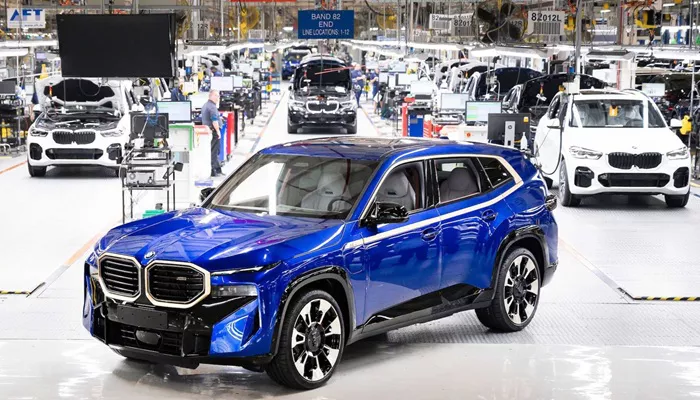BMW has reaffirmed its commitment to manufacturing electric vehicles (EVs) at its Spartanburg plant in South Carolina. This move is part of the automaker’s broader plan to shift toward electric mobility in the United States.
In October 2022, BMW Group announced a $1.7 billion investment to begin EV production in the U.S. The company allocated $1 billion to upgrade the Spartanburg plant for electric vehicle assembly. The remaining funds were set aside for constructing a high-voltage battery facility in Woodruff, South Carolina. The new battery plant will span over one million square feet.
As part of its long-term strategy, BMW also revealed plans to produce at least six fully electric BMW X models in the U.S. by 2030.
According to Wards Auto, BMW will manufacture the electric iX5, iX6, and iX7 models at the Spartanburg facility. Production of the iX5 is expected to begin in August 2026. It will be built alongside gasoline, diesel, and plug-in hybrid variants. The high-performance iX5 M70, which features a hydrogen fuel cell, and the iX6 are scheduled to enter production in 2028.
The all-electric iX7, a full-size luxury SUV, is set to debut in 2027, with production beginning later that year. It will be BMW’s first zero-emissions SUV in the full-size category.
BMW is also planning a powerful iX7 M70 version that will deliver over 800 horsepower. In addition, an ALPINA-tuned variant, known internally as the G69, could reach up to 900 horsepower, according to Wards Auto.
“Spartanburg, BMW’s largest global production site, is central to the brand’s strategy to electrify its SUV lineup,” Wards Auto reported. The Spartanburg plant has long been the manufacturing base for BMW’s X series vehicles, serving both North American and international markets. Now, BMW is transforming the site into a major hub for electrified SUVs, including plug-in hybrids and fully electric models.
This transition is backed by the construction of the Woodruff battery plant. The facility will produce sixth-generation high-voltage battery packs. Developed with battery technology partner Envision AESC, the plant will focus on performance and sustainability, sourcing materials locally whenever possible.
Speaking at BMW AG’s annual general meeting on May 14, Chairman Oliver Zipse said the company is currently the largest U.S. automotive exporter by value.
“Every second vehicle built at our Spartanburg plant is exported, generating an export value of over $10 billion in 2024 alone,” Zipse said. “Over the past 10 years, our total export value has exceeded $100 billion. Now, we are investing over $1.7 billion to bring Spartanburg up to speed for e-mobility. The first electric model from Spartanburg will roll off the line next year.”
A BMW press release issued on May 27 noted that the company has already introduced EV production at all its global manufacturing sites. Plant San Luis Potosí in Mexico will start producing BEV (battery electric vehicle) models from the Neue Klasse platform in 2027. That plant, along with BMW’s Rosslyn plant in South Africa, already builds plug-in hybrid vehicles. Rosslyn began plug-in hybrid production in 2024.
“As demand for EVs grows, our plants are steadily ramping up capacity,” the press release stated. In addition to Spartanburg, BMW now assembles fifth-generation high-voltage batteries at its facilities in Dingolfing, Regensburg, and Leipzig.


